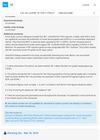 11 citations,
October 2021 in “Carbohydrate Polymers”
11 citations,
October 2021 in “Carbohydrate Polymers” Ginkgo biloba polysaccharides may reduce inflammation and promote hair growth in mice with hair loss.
9 citations,
February 2020 in “Journal of Cosmetic Dermatology” Pulsatilla chinensis compounds may help prevent stress-related hair loss.
[object Object]  7 citations,
August 2021 in “Heliyon”
7 citations,
August 2021 in “Heliyon” Phyllotex™ extract was found to significantly promote hair growth and protect against hair loss.
6 citations,
October 2015 in “Experimental dermatology” Adenine helps delay aging in human hair follicle cells.
 2 citations,
June 2022 in “Molecules”
2 citations,
June 2022 in “Molecules” Connarus semidecandrus Jack extract promotes hair growth and thickness, reduces prostate cancer cell growth, and could potentially be used as a treatment for hair loss.
 2 citations,
August 2024 in “International Journal of Dermatology”
2 citations,
August 2024 in “International Journal of Dermatology” Adipose stem cell-derived exosomes are safe and effective for hair regrowth in AGA patients.
 1 citations,
December 2022 in “Frontiers in Bioengineering and Biotechnology”
1 citations,
December 2022 in “Frontiers in Bioengineering and Biotechnology” New pharmaceutical biomaterials, especially nanomaterials, show promise for improving cancer treatment and disease diagnosis.
 1 citations,
September 2022 in “Journal of dermatological science”
1 citations,
September 2022 in “Journal of dermatological science” Certain vitamins and their derivatives can help hair grow longer by activating specific growth signals.
 January 2025 in “Current Issues in Molecular Biology”
January 2025 in “Current Issues in Molecular Biology” Certain plant extracts may help prevent hair loss and promote hair growth safely.
 August 2023 in “Journal of Investigative Dermatology”
August 2023 in “Journal of Investigative Dermatology” Ganoderma lucidum extract and its component, ganoderic acid A, may effectively prevent hair loss.
[object Object] Ganoderma Lucidum extract and ganoderic acid A can help prevent hair loss.
 February 2023 in “Scientific Reports”
February 2023 in “Scientific Reports” Cold Atmospheric Microwave Plasma (CAMP) helps hair cells grow and could potentially treat hair loss.

A natural compound called VB-1 can help promote hair growth by boosting a specific cell signal in human skin cells.
 318 citations,
January 2022 in “Signal Transduction and Targeted Therapy”
318 citations,
January 2022 in “Signal Transduction and Targeted Therapy” The Wnt/β-catenin pathway is important for body functions and diseases, and targeting it may treat conditions like cancer, but with safety challenges.
75 citations,
August 2018 in “Plant physiology” Hydrogen sulfide disrupts protein function and root hair growth in plants by modifying proteins.
37 citations,
June 2019 in “Stem cells” Special particles from skin cells can promote hair growth by activating a specific growth signal.
 35 citations,
January 2020 in “Skin Pharmacology and Physiology”
35 citations,
January 2020 in “Skin Pharmacology and Physiology” The review concluded that keeping the hair-growing ability of human dermal papilla cells is key for hair development and growth.
 26 citations,
July 2021 in “Frontiers in Cell and Developmental Biology”
26 citations,
July 2021 in “Frontiers in Cell and Developmental Biology” The review suggests that a special cell-derived treatment shows promise for various skin conditions and hair growth but needs more research for confirmation.
 21 citations,
May 2018 in “Journal of Cosmetic Dermatology”
21 citations,
May 2018 in “Journal of Cosmetic Dermatology” Costunolide helps human hair cells grow and can stimulate hair growth in mice.
 12 citations,
October 2021 in “Cells”
12 citations,
October 2021 in “Cells” Targeting a protein that blocks hair growth with microRNAs could lead to new hair loss treatments, but more research is needed.
 7 citations,
December 2021 in “Pharmaceutics”
7 citations,
December 2021 in “Pharmaceutics” Natural products like plant extracts can help promote hair growth and could be used to treat hair loss.
5 citations,
January 2021 in “Frontiers in Cell and Developmental Biology” Inhibiting Zyxin may help treat androgenetic alopecia by promoting hair growth.
5 citations,
January 2015 in “Saudi journal for health sciences” Alopecia areata in Taif is common, mainly immune-related, and best treated with topical corticosteroids and vitamins.
4 citations,
May 2022 in “PeerJ” Melatonin may help hair growth by affecting cell growth and hair-related signaling pathways.
 4 citations,
June 2021 in “Journal of Microbiology and Biotechnology”
4 citations,
June 2021 in “Journal of Microbiology and Biotechnology” Ginsenoside Rg4 from ginseng may help hair growth by activating certain cell signals.
 4 citations,
May 2022 in “Journal of Drug Delivery Science and Technology”
4 citations,
May 2022 in “Journal of Drug Delivery Science and Technology” Nanoliposomes effectively deliver hair-growth peptides into hair follicles.
4 citations,
March 2022 in “Pharmaceutics” Regenerative cellular therapies show promise for treating non-scarring hair loss but need more research.
4 citations,
June 2020 in “Cosmetics” Broussonetia papyrifera extract helps hair growth by regulating specific proteins.
3 citations,
February 2024 in “International journal of molecular sciences” Hesperidin from orange peels is a promising natural ingredient for skincare due to its multiple beneficial properties.
 3 citations,
May 2023 in “International Journal of Molecular Sciences”
3 citations,
May 2023 in “International Journal of Molecular Sciences” A new treatment using nanoparticles can effectively prevent and reduce hair loss caused by chemotherapy.



















